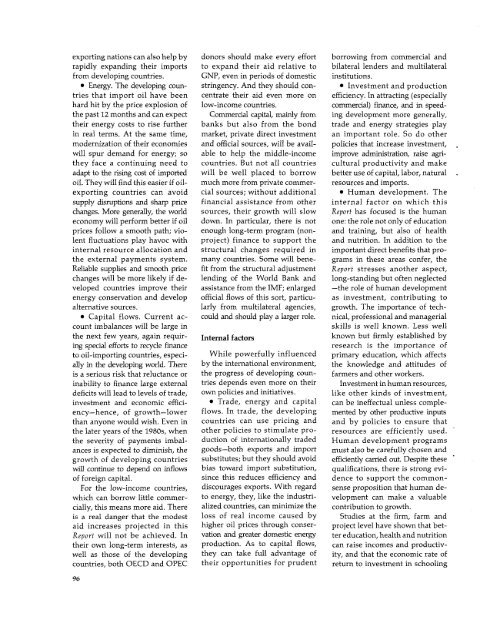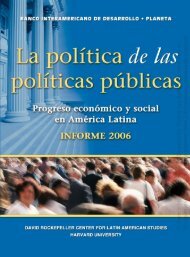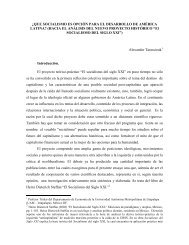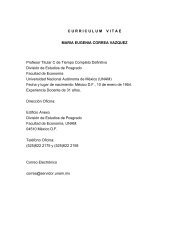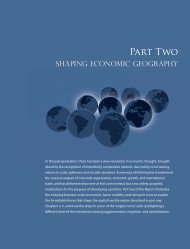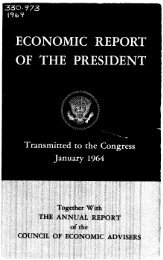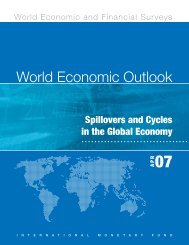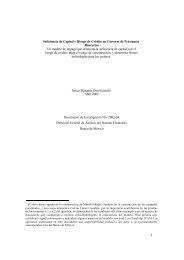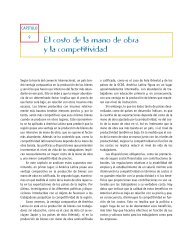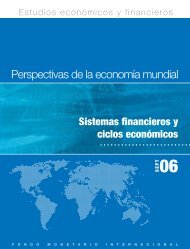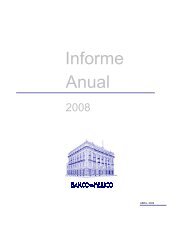exporting nations can also help by donors should make every effort borrowing from commercial andrapidly expanding their imports to expand their aid relative to bilateral lenders and multilateralfrom developing countries. GNP, even in periods of domestic institutions.* Energy. The developing coun- stringency. And they should con- 0 Investment and productiontries that import oil have been centrate their aid even more on efficiency. In attracting (especiallyhard hit by the price explosion of low-income countries. commercial) finance, and in speedthepast 12 months and can expect Commercial capital, mainly from ing development more generally,their energy costs to rise further banks but also from the bond trade and energy strategies playin real terms. At the same time, market, private direct investment an important role. So do othermodernization of their economies and official sources, will be avail- policies that increase investment,will spur demand for energy; so able to help the middle-income improve administration, raise agritheyface a continuing need to countries. But not all countries cultural productivity and makeadapt to the rising cost of imported will be well placed to borrow better use of capital, labor, naturaloil. They will find this easier if oil- much more from private commer- resources and imports.exporting countries can avoid cial sources; without additional * Human development. Thesupply disruptions and sharp price financial assistance from other internal factor on which thischanges. More generally, the world sources, their growth will slow Report has focused is the humaneconomy will perform better if oil down. In particular, there is not one: the role not only of educationprices follow a smooth path; vio- enough long-term program (non- and training, but also of healthlent fluctuations play havoc with project) finance to support the and nutrition. In addition to theinternal resource allocation and structural changes required in important direct benefits that protheexternal payments system. many countries. Some will bene- grams in these areas confer, theReliable supplies and smooth price fit from the structural adjustment Report stresses another aspect,changes will be more likely if de- lending of the <strong>World</strong> <strong>Bank</strong> and long-standing but often neglectedveloped countries improve their assistance from the IMF; enlarged -the role of human developmentenergy conservation and develop official flows of this sort, particu- as investment, contributing toalternative sources. larly from multilateral agencies, growth. The importance of tech-* Capital flows. Current ac- could and should play a larger role. nical, professional and managerialcount imbalances will be large inskills is well known. Less wellthe next few years, again requir- Internal factors known but firmly established bying special efforts to recycle finance research is the importance ofto oil-importing countries, especi- While powerfully influenced primary education, which affectsally in the developing world. There by the international environment, the knowledge and attitudes ofis a serious risk that reluctance or the progress of developing coun- farmers and other workers.inability to finance large external tries depends even more on their Investment in human resources,deficits will lead to levels of trade, own policies and initiatives. like other kinds of investment,investment and economic effici- * Trade, energy and capital can be ineffectual unless compleency-hence,of growth-lower flows. In trade, the developing mented by other productive inputsthan anyone would wish. Even in countries can use pricing and and by policies to ensure thatthe later years of the 1980s, when other policies to stimulate pro- resources are efficiently used.the severity of payments imbal- duction of internationally traded Human development programsances is expected to diminish, the goods-both exports and import must also be carefully chosen andgrowth of developing countries substitutes; but they should avoid efficiently carried out. Despite thesewill continue to depend on inflows bias toward import substitution, qualifications, there is strong eviofforeign capital. since this reduces efficiency and dence to support the common-For the low-income countries, discourages exports. With regard sense proposition that human dewhichcan borrow little commer- to energy, they, like the industri- velopment can make a valuablecially, this means more aid. There alized countries, can minimize the contribution to growth.is a real danger that the modest loss of real income caused by Studies at the firm, farm andaid increases projected in this higher oil prices through conser- project level have shown that bet-Report will not be achieved. In vation and greater domestic energy ter education, health and nutritiontheir own long-term interests, as production. As to capital flows, can raise incomes and productivwellas those of the developing they can take full advantage of ity, and that the economic rate ofcountries, both OECD and OPEC their opportunities for prudent return to investment in schooling96
is high, frequently well above that tion. Growth is vital to reducing all according to circumstances andof physical investment. For pri- aspects of absolute poverty-mal- policies. And it has its own momaryschooling, the rates of return nutrition, ill health and illiteracy, mentum: what is done (or notin a large group of countries aver- as well as low income-especially done) today powerfully influencesage more than 20 percent. At the in the poorest countries. But growth what can be done a decade oraggregate level, cross-country unaccompanied by other mea- more ahead.comparisons show that develop- sures may neither boost the in- * Practical aspects of humaning nations with higher literacy comes of the poor much, nor lead development. Human developmentrates have grown faster, even to much progress on nonincome is easier said than done. But muchwhen allowances are made for aspects of poverty. On both counts, has been learned about the comotherinfluences on growth and human development programs have parative efficacy of different poliforreverse causation-the effect a part to play. cies and programs. In nutrition,of growth on literacy. This finding * Raising the incomes of the for example, there is growingis reinforced by case studies and poor. The Report has discussed a agreement that the central issue ishistorical evidence. wide range of policies, many of not improving the balance be-* Population. One important which positively reinforce growth, tween calories and protein butway in which human develop- that can help raise the incomes of increasing the amount of staplement contributes to raising aver- the poor. Support of agriculture, foods the poor can afford; this inageincomes, as well as to other land and tenure reform, policies to volves raising their incomes, stimsocialgoals, is by reducing popu- raise the demand for labor and ulating production of these foodslation growth. Reducing fertility various kinds of research are four and, in some cases, targeted subisnot an end in itself; but lower important areas considered. Human sidies. In health the vital role ofpopulation growth in most devel- development is an essential com- primary care, together with eduopingcountries tends to result in plement. It accelerates the spread cation and control of mass diseases,greater investment per person in of new techniques to small farms is now generally acknowledged. Inphysical capital and human skills and increases the opportunities of fertility there is better under--and thus in faster growth. Better the poor for employment in the standing both of how to implenutritionand health, by lowering modern sector. And because fertil- ment family planning programsinfant mortality, are essential in- ity and family size are reduced, and of how such programs intergredieritsof fertility decline. So is the earnings of adults do not have act with socioeconomic and culturaleducation, especially of women, to be spread so thinly among chil- conditions. In education moresince it delays marriage, alters atti- dren and other dependents. importance is now attached to itstudes about family size and makes * Nonincome aspects of pov- behavioral effects; and in raisingmodern contraception more ac- erty. The worst aspects of absolute educational standards, the signifceptable.Increases in income poverty include not only low in- icance of class size has been shownthemselves are a cause, as well as come, but also malnutrition, fre- to be much less, and that of teachaconsequence, of reduced fertil- quent child death, disease and ing materials much more, thanity: people who are less poor have ignorance. All can be helped by was formerly believed.good reasons for wanting fewer human development programs. Hard experience has also shownchildren (including less need for Less obviously, there is a complex the difficulties of implementingtheir labor and for support in old interdependence between the dif- human development and how toage). And research has confirmed ferent facets of human develop- tackle them. Political obstaclesthat farnily planning programs also ment-as there is between human such as urban bias, competitionare important in bringing about development and increases in for resources, and the weak posislowerpopulation growth. income. Health, nutrition, educa- tion of the poor often have to betion and fertility all affect each overcome; but efforts to improveHuman development and poverty other. Most striking, partly becauseleast expected, are thebasic education, nutrition and healthhave a universal political appeal.Hurman development can thus powerful effects that education, The financial constraint on proassistgrowth. But the Report has especially female education, has grams often appears binding; butstressed even more its potential on fertility, child health and nutri- frequently there are unexploitedcontribution to reducing absolute tion. As this suggests, human de- ways of cutting costs and harnesspoverty.velopment is a circular process, ing additional resources. Human* Growth and poverty reduc- one that can be vicious or virtuous, development programs can also97
- Page 1:
t' 8 ~~~~ottoWorld Development Repo
- Page 4 and 5:
Oc 1980 by the International Bankfo
- Page 6 and 7:
ivThis report was prepared by a tea
- Page 8 and 9:
Text tables2.1 Summary of prospects
- Page 10 and 11:
DefinitionsCountry groups in the an
- Page 12 and 13:
illion people have barely enough fa
- Page 14:
in official aid and other capital a
- Page 17 and 18:
production and consumption; in- Tab
- Page 19 and 20:
measures can raise efficiency fairl
- Page 21 and 22:
adjustment; but the increases pro-
- Page 23 and 24:
dustrialized countries' GNP would T
- Page 25 and 26:
windfalls, some of their extra cont
- Page 27 and 28:
e done to increase the supplies Lat
- Page 29 and 30:
exchange-rate depreciation, by perc
- Page 31 and 32:
Table 3.2 World merchandise trade,
- Page 33 and 34:
* Inward-looking policies may exper
- Page 35 and 36:
inward-looking policies, with high
- Page 37 and 38:
cause individual banks or bank- Tab
- Page 39 and 40:
to GNP, of all large industrial na-
- Page 41 and 42:
in Chapter 2). Ways of increasing a
- Page 43 and 44:
4 Poverty, growth and human develop
- Page 45 and 46:
expectancy was less than 50 years,
- Page 47 and 48:
population density (see page 39). e
- Page 49 and 50:
ably could not have been achieved c
- Page 51 and 52:
ution of income typically is less T
- Page 53 and 54:
Table 4.2 Irrigation and income, se
- Page 55 and 56: ment strategies that assume that in
- Page 57 and 58: average 40 percent drop out before
- Page 59 and 60: this may be offset by shifts in the
- Page 61 and 62: UNESCO concluded that the poorUnemp
- Page 63 and 64: A typical finding showed the mean o
- Page 65 and 66: Table5.6 Differences in life tend t
- Page 67 and 68: are more expensive and less critica
- Page 69 and 70: per hos pital and clinic, and to st
- Page 71 and 72: peaks in farm work and widespreadin
- Page 73 and 74: confined to particular places. In A
- Page 75 and 76: Indonesia, Colombia and Chilehave r
- Page 77 and 78: (which respond only gradually to cu
- Page 79 and 80: Contraceptive technologyresearch in
- Page 81 and 82: 6 Implementing human development pr
- Page 83 and 84: probably China-have managed Table 6
- Page 85 and 86: percent of the development bud- dev
- Page 87 and 88: members, too, as no bureaucraticRur
- Page 89 and 90: Private costs of using public servi
- Page 91 and 92: ut not teachers or health workers,
- Page 93 and 94: 7 Priorities and progress in region
- Page 95 and 96: literacy and life expectancy); andF
- Page 97 and 98: to establish the necessary admin-Fi
- Page 99 and 100: Poverty Figure 7.5 South Asia: life
- Page 101 and 102: and North Africa cover the spec- gr
- Page 103 and 104: The high level of urbanization well
- Page 105: Chaipter 8 Summary and conclusionsI
- Page 109 and 110: Stat.istical appendix to Part ITabl
- Page 111 and 112: Table SA.6 Capital flows and debt o
- Page 113 and 114: Montgomery survey administra- publi
- Page 115 and 116: AnnexWorldDevelopmentIndicators
- Page 117 and 118: Table 13. Balance of Payments and D
- Page 119 and 120: IntroductionThe World Development I
- Page 121 and 122: GNP per capitaAverage indexAverageo
- Page 123 and 124: Average annual growth rate (percent
- Page 125 and 126: Distribution of gross domestic prod
- Page 127 and 128: Average annual growth rate (percent
- Page 129 and 130: Distribution of gross domestic prod
- Page 131 and 132: Distribution of value added (percen
- Page 133 and 134: EnergyEnergyconsumptionAverage annu
- Page 135 and 136: Merchandise tradeAverage annual gro
- Page 137 and 138: Percentage share of merchandise exp
- Page 139 and 140: Percentage share of merchandise imp
- Page 141 and 142: Destination of merchandise exports
- Page 143 and 144: Destination of manufactured exports
- Page 145 and 146: Current accountbalance before Inter
- Page 147 and 148: Public and publicly guaranteed medi
- Page 149 and 150: External public debtoutstanding and
- Page 151 and 152: Amount1981a 1982a 1983a 1984a 1985a
- Page 153 and 154: Average annualHypotheticalgrowth of
- Page 155 and 156: PercentageCrude Crude Percentage Pe
- Page 157 and 158:
Percentage ofpopulation ofworking a
- Page 159 and 160:
Percentage of urban population Numb
- Page 161 and 162:
Life Infant Childexpectancy mortali
- Page 163 and 164:
PercentageDaily calorie supplyPopul
- Page 165 and 166:
Number Numberenrolled in enrolled i
- Page 167 and 168:
Percentage share of household incom
- Page 169 and 170:
Average index Tables 4 and 5. Growt
- Page 171 and 172:
28 (minerals, crude fertilizers and
- Page 173 and 174:
continues to grow after replacement
- Page 175 and 176:
posttax income and conceptually tic
- Page 180:
-~~~ S-~~~~~ sEuropean Office:66, a


